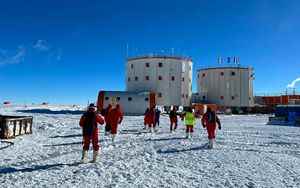(Finance) – It kicks off in the Italian-French Antarctic base of Concordia there summer research campaign 2022-23 of the National Antarctic Research Program (PNRA), funded by Ministry of University and Research (MUR) and managed by AENEAS for logistics planning and by the Cnr for scientific planning. With the arrival of the first group of technicians of the new expedition – ENEA informs in a note – the long period of isolation ends for the 13 winter residents of the 18th winterover who carried out research and maintenance activities on the base, which remained unreachable for nine months due to outdoor temperatures down to -80°C.
Until next February 45 researchers – 27 Italians and 18 French – will take turns in the station at over 3 thousand on the eastern Antarctic plateau to work on 30 research projects in astronomy, earth sciences, atmospheric physics and chemistry, climatology and medicine. Among these projects, 17 will be managed by the PNRA, 11 by the French Polar Institute Paul Emile Victor (IPEV) and 2 managed jointly. Furthermore, from next February i 13 new winterers from the 19th winterover – 6 Italians, 6 French and 1 German doctor from the European Space Agency (ESA) – will be responsible for maintaining the infrastructure and winter research activities for the next 9 months, including 9 biomedical projects in collaboration with ESA.
In support of the various research projects, Concordia will also be present 35 technicians from the PNRA and the IPEV, engaged in base management activities and loading and unloading of flights carrying personnel, food and scientific instruments. Furthermore, they will manage the operations related to the sleepers, the long convoys pulled by sledges that move fuel and heavy materials from the coast to Concordia station.
There Concordia station will also give support to the remote field of Little Dome C. about 40 kilometers away, where the European project Beyond Epica Oldest Ice is underway, the largest study on climate change, which aims to extract the oldest ice core on Earth at a depth of about 3,000 meters to obtain information on the climate terrestrial until 1.5 million years ago.
“This start to the season in Concordia is strongly conditioned by the still very low temperatures, which remain below -45°C for most of the day, about 5°C less than in past years – he explains Rocco Ascione of ENEA, station leader of Concordia –. In these conditions, outdoor work becomes extremely difficult: even on windy days, the personnel were exposed to a windchill[1] up to -65°C, perceiving temperatures much lower than the real ones. Low temperatures are also limiting the normal use of mechanical means. However, we managed to bring the equipment and means of transport back to the surface from their winter shelter, built under the ice where the temperature remains constant around -50°C even during the long Antarctic winter”.
